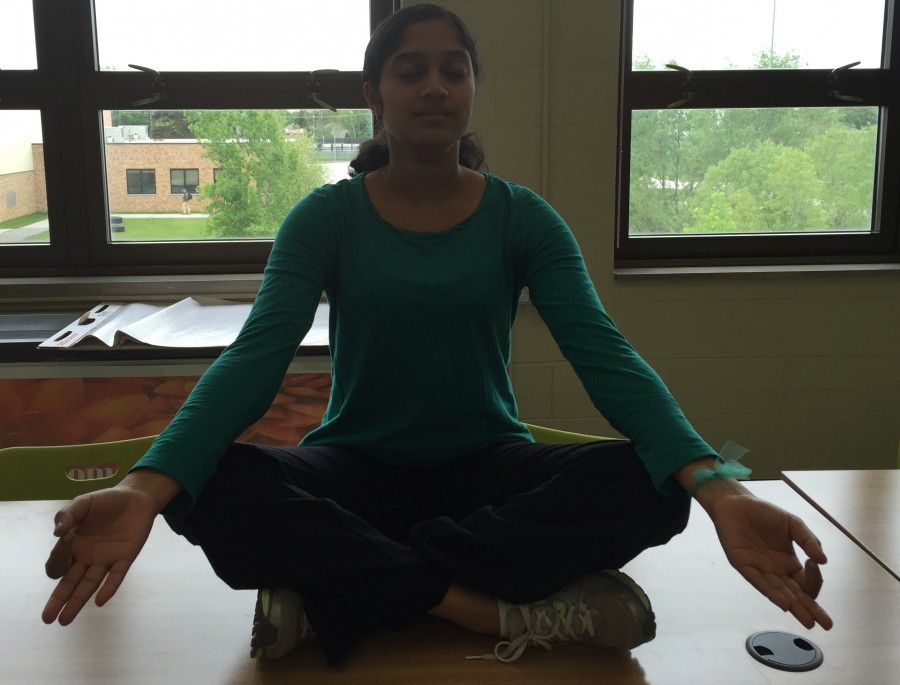Got meditating on the mind
Difficult to capture in a dark room, senior Sanjana Srinivasan takes a break from her studies to clear her mind.
There’s no doubt that people feel stressed, some more than others, and that stress sometimes is not dealt with effectively.
At Central, people are concerned for the mental well-being of students and staff and ask themselves: what can we do better? How can we help?
Kimberly Williams, English teacher, said, “We’re teaching people, not subjects and if our people aren’t well, they can’t learn.”
She and many members of the D86 community from social workers to teachers to deans are on a relatively new committee focused on implementing the Stage I of the Illinois Learning Standards called Social Emotional Learning (SEL).
“I don’t see a downside to creating more social emotional learning in all schools,” said Kelly Watson, physicaly education and health teacher.
There are three overarching goals of the SEL initiative which are broken down by grade levels. The committee is in the planning stage of how to effectively implement these to best support the students and staff.
Another member of the committee is Robyn Corelitz, English teacher. Corelitz, a yoga and meditation teacher who specializes in child and teen, said meditation is one aspect that could be implemented into the school system.
“Mindfulness is really powerful in terms of self regulation, being reflective, being self aware,” Corelitz said.
Research has linked mindfulness to decreased stress hormones and increased productivity, focus, creativity, and empathy as a few benefits of the training and practice of mindfulness.
Corelitz has her freshman and senior English classes do “quiet time,” or transcendental meditation sometimes before class starts.
“Research shows that the most effective way is to do it at the beginning of every day school wide,” Corelitz said.
She also practices free writing, where students are asked to reflect in their journals and then share from their writing.
“When we’re writing by hand, we’re doing that cross body movement and….accessing the same type of mindfulness techniques as you would for quiet time,” Corelitz said.
Hanna Suek, senior in Corelitz’s AP Literature and Composition class, was a fan of this part of Corelitz’s agenda.
“I really enjoyed our quiet times/meditation because it was complete respite from my hectic schedule,” Suek said. “I started to look forward to it more and more every day and actually felt like it was making a difference.”
That difference included more energy and focus.
Dominique Kokoszka, senior in another one of Corelitz’s AP Lit classes, agrees.
“I think people were either more focused and aware after meditation, or more tired and ready for a nap, but over all I feel people liked that time to get ready for class and have time to gather their thoughts,” Kokoszka said.
Watson also brings meditation to her students’ attention.
“In health, we discuss the importance of meditation and how helpful it can be to your mental health which in turn is positive for your overall health,” Watson said. “Our lives are all so hustle and bustle and we need to take time and just relax.”
In her PE classes, she tries to do a some sort of yoga or meditation at least once a week.
“In PE class I do take at least once a week to either do yoga or meditation/relaxation. The students love it and I think it is a time where maybe they aren’t talking or texting or tweeting or snap chatting and they can just relax,” Watson said.
Separate from the SEL Committee’s helping the well-being of students in the future, students should look for ways to manage their stress.
Watson stresses getting out there and to people in person, meeting new friends and connecting with old ones face-to-face. She also reminds us of some great tips to achieve well-being: exercise, do yoga or meditate, manage your time, don’t procrastinate, make time to socialize, ask others for help, eat healthily, get enough sleep.
For someone wishing to be more mindful and reap the benefits of it, Corelitz suggests, “Make an effort once a week, or more, for even fifteen or twenty minutes, to leave your phone somewhere where you can’t do it and just go for a walk.”














